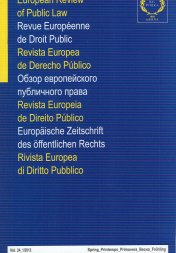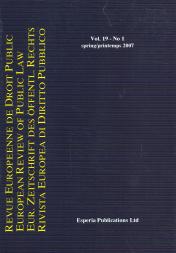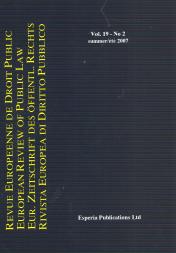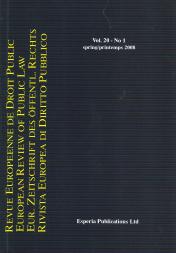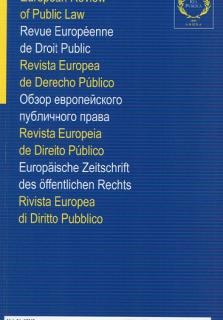
Administrative Law / Droit administratif
FEDERAL REPUBLIC OF GERMANY /
REPUBLIQUE FEDERALE D'ALLEMAGNE
MICHAEL BRENNER
Professor Dr., Universität Jena
JONAS HYCKEL
Studentischer Mitarbeiter, Universität Jena
ROBERT STENDEL
Studentischer Mitarbeiter, Universität Jena
During the period under review, the Federal Administrative Court dealt with several questions concerning the Administrative Law, which were to an extent also in a dogmatic view of extraordinary interest. Apart from various aspects of General Administrative Law and of Administrative Procedural Law, the Court dealt with the "classical" fields of the Specific Features of Administrative Law, such as Civil Service Law, Examination Law and Municipal Law, but often also with questions concerning Planning Law. In the course of this, a high priority was given to Construction Law, as well as to Air Traffic Law; especially the latter was in view of banning night flights of great, also public, interest. Moreover, the Court had to address various issues in the field of Asylum and Residence Law. Of increasing importance is also the right to information, which could be further clarified by the Federal Administrative Court during the period under review. This enormous range of decisions taken by the Federal Administrative Court demonstrates once more that the modern society has been juridified to a great extent - and this juridification is, as the chronicle outlines, in many cases a juridification which has its roots in General Administrative Law and the Specific Features of Administrative Law and aims in many cases, such as in Planning Law, to balance private and public interests.
Durant la période examinée, la Cour administrative fédérale s'est penchée sur quelques questions relatives au droit administratif qui ont aussi été, dans une certaine mesure, d'un très grand intérêt théorique. En dehors de divers aspects du droit administratif général et de la procédure administrative, la Cour s'est occupée de domaines "classiques" des caractéristiques spécifiques du droit administratif, tels que la législation de la fonction publique, l'instruction et la législation nationale, mais souvent aussi de questions concernant le droit de l'urbanisme. Ce faisant, la priorité a été donnée essentiellement au droit de la construction et au droit de l'aménagement du trafic aérien; ce dernier spécialement concernait l'interdiction de vols de nuit d'un grand intérêt, et donc d'intérêt public. En outre, la Cour a eu à traiter diverses questions relevant du droit d'asile et de séjour. De même, l'importance du droit à l'information ne cesse de croître et il a peut-être été clarifié davantage par la Cour administrative fédérale durant la période examinée. La grande variété de décisions rendues par la Cour administrative fédérale montre une fois de plus que la so¬ciété moderne a été largement juridifiée et que souvent, comme le souligne la chronique, cette juridification a ses racines dans le droit administratif général ou dans les caractéristiques spécifiques du droit administratif et requiert souvent, comme en droit de l'urbanisme, un équilibre entre intérêts publics et privés.
Die verwaltungsrechtlichen Fragestellungen, mit denen sich das Bundesverwaltungsgericht im Berichtszeitraum zu befassen hatte, waren vielfältig, zum Teil auch dogmatisch überaus interessant. Neben verschiedenen Aspekten des Allgemeinen Verwaltungsrechts und des Verwaltungsprozessrechts hatte sich das Gerichte neben "klassischen" Bereichen des Besonderen Verwaltungsrechts, wie etwa dem Beamten-, dem Prüfungs- und dem Kommunalrecht, vielfach mit Fragen des Planungsrechts zu beschäftigen. Dabei nahm naturgemäß das Bauplanungsrecht, daneben aber auch das Luftverkehrsplanungsrecht einen besonders hohen Stellenwert ein; insbesondere letzteres war im Hinblick auf Nachtflugverbote von großer, auch öffentlichkeitswirksamer Bedeutung. Darüber hinaus hatte das Gericht zahlreiche Fragestellungen aus dem Bereich des Asyl- und Aufenthaltsrechts zu klären. Zunehmend Bedeutung erlangt auch das Informationsrecht, zu dem das Bundesverwaltungsgericht im Berichtszeitraum weitere Klärungen vornehmen konnte. Erneut macht diese enorme Spannbreite der vom Bundesverwaltungsgericht getroffenen Entscheidungen deutlich, dass die moderne Gesellschaft in weitreichendem Maße verrechtlicht ist – und diese Verrechtlichung ist, wie der Bericht deutlich macht, vielfach eine Verrechtlichung, die im Allgemeinen und Besonderen Verwaltungsrecht angesiedelt ist, und, etwa im Planungsrecht, vielfach auf einen Ausgleich privater und öffentlicher Interessen ausgerichtet ist.














